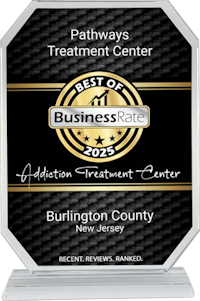CBT for Addiction in Burlington, New Jersey
Cognitive Behavioral Therapy (CBT) helps individuals challenge harmful thoughts and behaviors that fuel substance use. Our trained clinicians use CBT to equip clients with healthier patterns and lasting coping strategies.
CBT for Addiction in New Jersey
CBT for Addiction
Cognitive Behavioral Therapy (CBT) is a therapeutic treatment method for individuals struggling with addiction, though it has applications for many therapeutic settings. CBT has been proven effective in treating a variety of mental health issues, including anxiety, depression, and even certain phobias. By focusing on the connections between thoughts, feelings, and actions, CBT works to uncover and address underlying issues that contribute to addiction.
What is Cognitive Behavioral Therapy (CBT)?
The core principle of CBT is that our thoughts, beliefs, and behaviors are all interconnected. By changing our thoughts, we can ultimately change how we feel and act in different situations. A key aspect of CBT is the collaborative nature of the therapeutic relationship between the therapist and the client. Together, they work to identify and challenge cognitive distortions, such as black-and-white thinking, catastrophizing, or overgeneralization.
By examining these thought patterns and exploring alternative perspectives, individuals can develop more adaptive ways of thinking and coping with life’s challenges. Homework assignments and practical exercises encourage individuals to apply the skills they learn in therapy to their daily lives, which can help foster long-lasting change and growth.
Cognitive behavioral intervention, a component of CBT, is particularly effective in treating Post-Traumatic Stress Disorder (PTSD) by incorporating techniques such as exposure therapy, anxiety management, and cognitive therapy aimed at challenging negative thoughts and emotions.
The Triangle of Cognition
The foundation of CBT is the triangle of cognition. This concept suggests that our thoughts, emotions, and behaviors are interconnected and influence one another. By exploring these connections, individuals can gain insight into the underlying factors contributing to addiction and develop healthier coping mechanisms through cognitive behavioral interventions.
Thoughts play a crucial role in shaping emotions and behaviors. For example, someone struggling with addiction may have automatic negative thoughts about themselves, such as “I am worthless” or “I will never overcome this.” These thoughts can trigger intense emotions like sadness, hopelessness, or anxiety, leading to maladaptive behaviors such as substance abuse as a way to cope.
But behaviors can also impact our thoughts and emotions. Engaging in substance abuse, for instance, can further reinforce negative beliefs about oneself and perpetuate a cycle of addiction. By addressing and challenging these cognitive distortions, individuals can begin to break free from the grip of addiction and cultivate a more adaptive mindset.
Cognitive behavioral therapy techniques can be used as powerful tools for treating various mental health issues, including depression and anxiety disorders. One of the key aspects of CBT is its focus on identifying and challenging distorted thinking patterns that may fuel addictive behaviors. Through targeted interventions and techniques, individuals undergoing CBT can learn to reframe their thoughts and develop healthier perspectives towards substance use.
CBT is not just about addressing the symptoms of addiction; it also delves into the root causes and underlying factors that may have led to the development of addictive behaviors in the first place. By exploring past experiences, traumas, and environmental influences, individuals in CBT can gain a deeper understanding of the complex interplay between their thoughts, emotions, behaviors, and actions.
Can CBT Help with Relapse Prevention?
One of the greatest challenges individuals face after completing addiction treatment is avoiding relapse. CBT can play a crucial role in relapse prevention by helping individuals recognize and manage triggers effectively through the development of essential coping skills. Through CBT, individuals learn skills and strategies to identify high-risk situations and develop coping mechanisms that deter them from turning to substance abuse.
Whether someone is addicted to alcohol or something as difficult to obtain as meth, it’s important to have a solid plan in place to avoid relapse. Knowing what coping skills are helpful in commonly encountered situations can be invaluable. An individual may choose to continue cognitive behavioral treatment after leaving addiction treatment. But whether or not they do, CBT can help in constructing a relapse prevention plan based on what actually works in the person’s life.

By addressing the underlying thoughts and beliefs that contribute to addictive behaviors, CBT helps individuals reframe their perspectives and develop healthier ways of coping with stress and cravings. The process of analyzing one’s patterns in CBT treatment helps individuals to build resilience and make positive choices that support their recovery journey.
Triggers can be certain people, places, or situations, which can significantly increase the likelihood of relapse. It is important to note that triggers can vary greatly from person to person. For some individuals, a trigger may be a specific smell that reminds them of past substance use. For others, it could be a particular social setting where they feel pressured to engage in unhealthy behaviors. A therapist in addiction therapy can help individuals explore and uncover their personal triggers, gaining valuable insight into their own thought patterns and behaviors.
CBT teaches individuals to identify their unique triggers and develop healthier responses. This is particularly important for people seeking treatment for a dual diagnosis, especially anxiety disorders. By recognizing and acknowledging triggers, individuals can implement strategies to avoid them or minimize their impact. CBT can help individuals recognize the patterns that result in substance use, which can help remove their power.
Once triggers have been identified, individuals can work on creating a comprehensive relapse prevention plan. This plan may include coping strategies, healthy habits, and a support network of affirming people that the individual can turn to in times of need. By proactively addressing triggers and developing effective coping mechanisms, individuals can greatly increase their chances of maintaining long-term sobriety and improving their overall well-being.
In addition to personal triggers, it’s important for individuals in addiction recovery to become aware of the environmental factors that contribute to their cravings and drug abuse. Through CBT, individuals can work to identify and address the external factors that influence their behavior, such as peer pressure, stressful situations, or easy access to substances. By understanding these factors, individuals can develop effective strategies to overcome cravings and make healthier choices.
The quality of a person’s support network is incredibly important. Individuals in recovery may feel compelled to use substances in social situations to fit in, avoid feeling left out, or to compensate for a lack of coping skills in social situations. It is essential for individuals to recognize these pressures, and CBT can help an individual person identify thoughts and beliefs that arise in these situations. Developing healthy coping mechanisms, such as mindfulness techniques or reaching out to help, can help individuals navigate these challenging situations without turning to substances.
Is Cognitive Behavioral Therapy Compatible with Other Therapy Modalities?
 CBT can be used as a standalone treatment or in combination with other therapy modalities. Its flexibility allows for integration with various approaches, such as individual counseling, group therapy, family therapy, or dialectical behavioral therapy (DBT). CBT can sometimes enhance the overall effectiveness of treatment and support long-term recovery due to its ground-up approach to addiction treatment.
CBT can be used as a standalone treatment or in combination with other therapy modalities. Its flexibility allows for integration with various approaches, such as individual counseling, group therapy, family therapy, or dialectical behavioral therapy (DBT). CBT can sometimes enhance the overall effectiveness of treatment and support long-term recovery due to its ground-up approach to addiction treatment.
CBT can also be effectively combined with holistic treatments for addiction, including mindfulness-based therapies and nutritional therapies. Because of its nature, CBT can help promote healthier coping mechanisms and self-awareness through structured therapeutic techniques. The integration of mindfulness practices, such as meditation and yoga, can enhance the cognitive restructuring process in CBT by fostering a deeper connection between thoughts, emotions, and behaviors.
In many situations, CBT is often integrated with pharmacological treatments such as medication-assisted treatment (MAT). It can be a good starting therapy for someone beginning their treatment for substance use disorders, or who is dealing with withdrawals and trying to find out the sources of their cravings. If a person is undergoing dual diagnosis treatment for a mental illness, CBT can help them better understand their minds with newfound clarity. A collaborative effort between therapy and medication can lead to improved symptom management and better overall outcomes for individuals seeking mental health support.
Heal From Addiction with CBT at Pathways Treatment Center in Burlington, New Jersey
For individuals seeking help for addiction, Pathways Treatment Center offers comprehensive and personalized treatment programs. With a team of experienced professionals, individuals can undergo evidence-based therapies (including CBT) to address the complex nature of addiction. By addressing underlying issues and developing healthy coping mechanisms, individuals can embark on a path to long-lasting recovery.
If you’re ready to begin your journey to recovery, contact us today. It’s never too late to turn toward sobriety, and we are here to help you on the journey.



